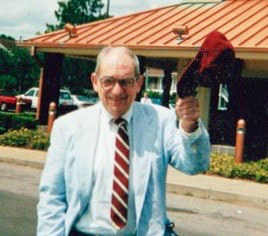Charles Henderson, Jr.
1923-2015
(This obituary was written by Ward Briggs for the Society of Classical Studies and was originally posted here.)
Charles Henderson, Jr., was born in Lynchburg, VA, on August 22, 1923, but was reared in Charlottesville, VA. He graduated from Davidson in 1942 at the age of 19. He attended one semester of graduate  work at the University of North Carolina before enlisting in the Navy, reaching the rank of lieutenant (promoted to lieutenant commander in the Reserve after the war) and served aboard the Buckley-class destroyer escort U.S.S. Manning. Following the war he returned to the University of North Carolina where he received his M.A. in 1947, working under his mentor, B.L. Ullman (1882-1965). He remained as a graduate student and teaching fellow while completing the coursework for his doctorate, but in late 1948, the university administration imposed a loyalty oath on graduate students, in hopes of forestalling a stricter oath with harsher penalties that might come from the trustees or the legislature. The oath was aimed at a prominent Communist teaching assistant in the Romance Languages Department. He and Henderson were the only two graduate students in the University who refused to sign. Henderson was kept on for 1949-50, but his stipend was cut and he was only allowed to grade correspondence coursework. In spite of this difficulty, the Navy promoted him and he found a job at Washington Square College at NYU, where in 1955 he was able to complete “A Lexicon of the Stylistic Terms Used in Roman Literary Criticism,” his three-volume, 903-page dissertation (surely a record and one that graduate students should not be encouraged to break).
work at the University of North Carolina before enlisting in the Navy, reaching the rank of lieutenant (promoted to lieutenant commander in the Reserve after the war) and served aboard the Buckley-class destroyer escort U.S.S. Manning. Following the war he returned to the University of North Carolina where he received his M.A. in 1947, working under his mentor, B.L. Ullman (1882-1965). He remained as a graduate student and teaching fellow while completing the coursework for his doctorate, but in late 1948, the university administration imposed a loyalty oath on graduate students, in hopes of forestalling a stricter oath with harsher penalties that might come from the trustees or the legislature. The oath was aimed at a prominent Communist teaching assistant in the Romance Languages Department. He and Henderson were the only two graduate students in the University who refused to sign. Henderson was kept on for 1949-50, but his stipend was cut and he was only allowed to grade correspondence coursework. In spite of this difficulty, the Navy promoted him and he found a job at Washington Square College at NYU, where in 1955 he was able to complete “A Lexicon of the Stylistic Terms Used in Roman Literary Criticism,” his three-volume, 903-page dissertation (surely a record and one that graduate students should not be encouraged to break).
With Ullman's enthusiastic support, the newly-fledged Ph.D. was hired to a permanent position at UNC in 1955, following the publication of a portion of his dissertation, "Cato's Pine Cones and Seneca's Plums. Fronto p. 149 vdH.," TAPA 86 (1955) 256-267, an indication of the high quality of his work. He was known at Chapel Hill as a generous adviser to graduate students and an effective teacher who instilled great affection in his undergraduates. An able administrator, he was dean of student affairs from 1960 to 1963, and secretary-treasurer of the APA from 1962 to 1965. He edited a two-volume Festschrift for Ullman in his last year in Chapel Hill, but he was not a prolific publisher. He is perhaps best known for his revisions (the first in 1962) of Ullman and Norman E. Henry's high-school textbook series, Latin for Americans, a series begun in 1941 and still in print and in use, updated for the twenty-first century, at the time of his death. Henderson decamped for Smith College in 1964, where he spent more than two decades as a beloved teacher, nurturing classics students and encouraging the best of them to pursue graduate studies in Chapel Hill, which many of them did. At Smith he was chair of the Classics Department (1967-74) and assistant to the President (1972-7).
He spent the early part of his retirement sailing his boat, sometimes alone, about the Mediterranean, and the later part maintaining his great aunt’s home and large garden on the York River in Maine, a job that would have taxed a man half his age. In his late seventies he wrote an article in which he described his own struggles with the loyalty oath along with those of other classicists caught up in the McCarthy era: Harold Cherniss, Ludwig Edelstein, Moses Finley, G.M.A. Grube, Bernard Knox, Naphtali Lewis, Brooks Otis, William H. Willis, and others (TAPA 131:353-62). Though he wrote of his pride in being associated with such a group of notables, he averred that he was one of its lesser lights. He attended his last APA-SCS meeting in New Orleans in January 2015. There he prophetically spoke of it as his “’cygnea vox’ at the APA. He died at his home in York Harbor on April 19, 2015 at the age of 92.
Ward Briggs
